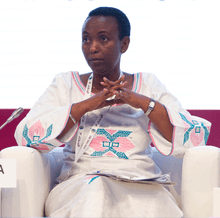Aloisea Inyumba
Aloisea Inyumba (28 December 1964 – 6 December 2012) was a Rwandan politician, who served as the country's Minister for Gender and Family Promotion and as executive secretary of the National Unity and Reconciliation Commission.[1]
Aloisea Inyumba | |
|---|---|
 Aloisea Inyumba at the UNCTAD XIII High Level Event on Women in Development, April 2012 | |
| Minister for Gender and Family Promotion |
While studying social work and social administration at Makerere University in Uganda, she joined the Rwandan Patriotic Front.[1]
The eulogy at her funeral was given by President Paul Kagame.[1]
Early life
Aloisea Inyumba was born on 28 December 1964 in Uganda, to Rwandan born parents.[1] She was born in the aftermath of the 1959 Rwandan Revolution, which saw the creation of a republic dominated by the majority Hutu, and persecution of the minority Tutsi.[2] While her parents were still living in Rwanda, and before she was born, Inyumba's father was killed in a massacre of Tutsi; her mother escaped with her five siblings, and the family fled to the safety of Uganda.[1]
Inyumba lived her childhood in Uganda, completing her schooling there, and then proceeded to Makerere University in Kampala, to study for a degree in social work and social administration.[1] In 1985, she had her first meeting with Paul Kagame,[3] another Rwandan refugee who was at the time serving in the rebel army of Yoweri Museveni.[4] One year later, Museveni took control of the country and promoted Kagame and fellow Rwandan Fred Rwigyema to officers in the country's national army.[5] Kagame and Rwigyema took these positions, but their ultimate goal was to return with force to their own country, in order to facilitate the return of the refugees.[6] Kagame and Rwigyema joined and took over the Rwandan Patriotic Front,[7] a Rwandan liberation organisation, and Inyumba joined as well.[1]
Political career
After the RPF military victory in July 1994, Inyumba was appointed into the newly formed transitional government;[1] this government was headed by President Pasteur Bizimungu, but the country was de facto led by Paul Kagame.[8] She was appointed to the post of Minister of Gender and Family Promotion,[1] and began a concerted programme to involve women in the rebuilding of Rwanda.[1]
In 2011, she was re-appointed to her previous role of Minister of Gender and Family Promotion, a role she held until her death in 2012.[1]
Personal life and death
Aloisea Inyumba was married to Dr Richard Masozera, who is the former Director-General of Rwanda Civil Aviation Authority (RCAA).[9] The pair began dating when they were both students at Makerere University in Kampala.[9] The couple had two children, a girl and a boy.[3]
Inyumba died on 6 December 2012 at her home in Kigali.[10] She had been suffering from throat cancer,[11] and had recently returned home after seeking treatment in Germany.[3] Inyumba was granted a state funeral at the Parliament of Rwanda building in Kigali, and her eulogy was delivered by the country's president, Paul Kagame.[3] Kagame described her as a selfless leader who was "a very good cadre and ideologically clear".[3] Other speakers at the funeral included Cabinet Affairs minister Protais Musoni and the vice-governor of the National Bank of Rwanda, Monique Nsanzabaganwa.[3]
See also
External link
References
- Melvern, Linda (8 March 2013). "Aloisea Inyumba: Politician who played a key role in the rebuilding of Rwanda". The Independent. Retrieved 15 October 2014.
- Prunier 1999, p. 51.
- The New Times (10 December 2012). "Kagame pays last respects to late Inyumba". Retrieved 20 October 2016.
- Kinzer 2008, pp. 44–45.
- Kinzer 2008, pp. 50–51.
- Kinzer 2008, pp. 51–52.
- Kinzer 2008, pp. 48–50.
- Prunier 1999, p. 369.
- Rwirwahira, Rodrigue (14 December 2012). "Kagame leads nation in eulogising patriot and freedom fighter Inyumba". The East African. Retrieved 20 October 2016.
- Musoni, Edwin (7 December 2012). "Minister Aloisea Inyumba dies at 48". The New Times. Retrieved 20 October 2016.
- Nsanzimana, Jean-Christophe (10 December 2012). "Aloisea Inyumba Laid to Rest". Rwanda Focus. Retrieved 20 October 2016.
Cited works
- Prunier, Gérard (1999). The Rwanda Crisis: History of a Genocide (2nd ed.). Kampala: Fountain Publishers Limited. ISBN 978-9970-02-089-8.CS1 maint: ref=harv (link)
- Kinzer, Stephen (2008). A Thousand Hills: Rwanda's Rebirth and the Man Who Dreamed it (Hardcover ed.). Hoboken, N.J.: John Wiley & Sons. ISBN 978-0-470-12015-6.CS1 maint: ref=harv (link)